Guides • Understanding Publishing
Last updated on Mar 29, 2024
How to Write a Query Letter [+ Free Template]
A query letter is an inquiry sent to multiple literary agents to gauge their interest in representing your book for publication. The best agents receive dozens of queries a day but only sign a few authors per year, so crafting a successful query letter is a crucial step in the world of traditional publishing.
In this article, we’ll share the elements that make a query letter successful, such as:
- The Hook — to grab the agents’ attention.
- The Synopsis — to quickly pitch your book’s story.
- The Proof — to make the case that there’s a market for your book and that they will want to work with you.
To help you write your query letter, we put together a free template that will help you get started, which is included in our querying toolkit below.
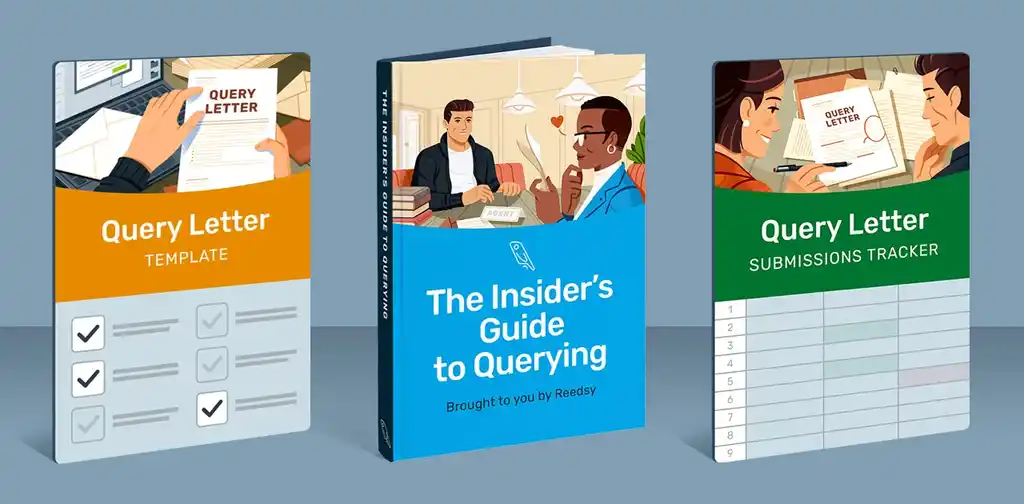
FREE TOOLKIT
Get everything you need to query
Download our agent-approved ebook + submissions tracker + query letter template.
How to write a query letter:
- 1. Start the query letter with a greeting
- 2. Write a strong “hook” for the book
- 3. Include a story synopsis
- 4. Compare your book to published titles
- 5. Pitch your author credentials
- 6. Personalize to stand out from other queries
- 7. Close the letter by thanking the agent
- 8. Hire a professional editor for a query letter review
1. Start the query letter with a greeting
First off, keep the salutation simple. “Dear Carrie" is perfectly fine, assuming that Carrie is the agent's first name. Addressing agents by their surname ("Dear Ms. Greaves") is also fine, though the formality may feel outdated, and you risk accidentally misgendering them.
The next line should make the agent prick up their ears. We’ve listed some ways to achieve that effect below.
Lead with previous success or accolades
If you’ve published before, you can start by briefly mentioning any critical recognition or awards you've received for your previous work.
I’m seeking representation for my second novel, Cobalt Eyes. This book is the follow-up to my self-published novel Inferno Hearts, which was shortlisted for the Jay Malcolm Independent Prize last year.
An agent will always want to find publishable clients — and if you’ve already had some publishing success (no matter how small), that will likely work to your advantage. It doesn’t have to be full-length novels; it could also be novellas or short stories previously published in literary magazines.
Reveal a personal connection
If you haven’t published before, another good way to start is with a personal connection:
We met last year at the Writer’s Digest Annual Conference and chatted briefly about your work with up-and-coming suspense authors.
Or better yet, get a referral from an established author or a publishing insider.
“You want something that will bring the submission directly to the agent rather than an assistant or an intern,” says Reedsy editor and former agent Fran Lebowitz (no relation to the NYC social commentator). “Showing that you are connected never hurts.”
Jane Doe at Del Rey Books suggested that I contact you regarding representation for my debut science fiction novel, Arbormancer.
But if you don’t have any industry connections to speak of, don’t fret.
Or just pitch the book
Your main sales tool should be your book itself. If you can’t think of a clever way to hook an agent in, just jump straight into your pitch by sharing three key pieces of information that will instantly paint a picture of your book:
- The title
- The book’s genre
- The word count (rounded to the nearest thousand)
I’m writing to seek representation for my 92,000-word crime thriller, Operation Kill.
These three pieces of info are what every agency reader will want to know, and they will thank you for sharing it upfront. In particular, they will want to know if your genre fits in with the sort of book they’re looking for and whether your word count meets current market expectations.
💡 Tip: With your debut novel, it’s always worth keeping your length within the word count range of successful books in your genre.
The next step involves gripping the agent's attention with a powerful story hook.
2. Write a strong “hook” for the book
Just as your novel must get readers involved within the first few pages, your query letter must pique an agent's interest within a few lines. This part of the letter is known as the hook, and it’s a short description of your book’s concept which will help agents get the gist of it at a glance.
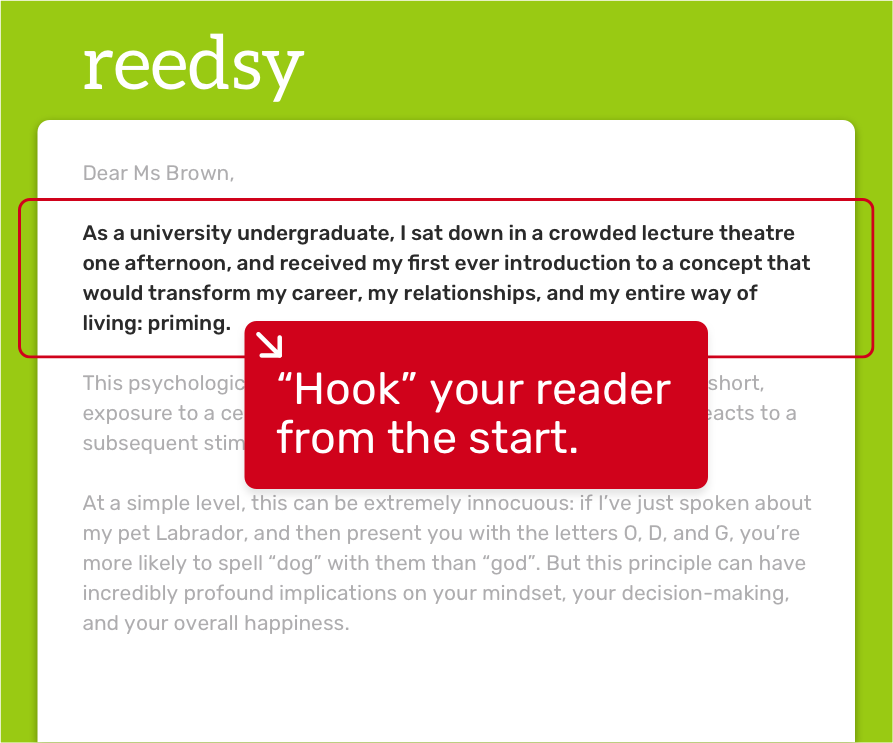
The hook should present the most interesting elements of your story, like an original concept, a powerful conflict, or a compelling question that leaves the agent intrigued. Let’s look at these approaches one at a time below.
An exciting concept
Let’s consider a hook for C.S. Lewis’ classic fantasy novel The Lion, the Witch and the Wardrobe:
Four adventurous siblings – Peter, Susan, Edmund, and Lucy Pevensie – step through a wardrobe door and into the land of Narnia, a land frozen in eternal winter and enslaved by the power of the White Witch. But when almost all hope is lost, the return of the Great Lion, Aslan, signals a great change… and a great sacrifice.
You have a magical world, mysterious creatures, and hints of an epic battle 一 it's certainly an exciting concept worth reading more about.
A powerful central conflict
You could also build your hook around an intriguing central conflict. For example, here’s a hook example for Liane Moriarty’s Nine Perfect Strangers:
Nine people gather at a remote health resort. Some are here to lose weight, some are here to get a reboot on life, some are here for reasons they can’t even admit to themselves. Amidst all of the luxury and pampering, the mindfulness and meditation, they know these ten days might involve some real work. But none of them could imagine just how challenging the next ten days are going to be.
Instantly, one can feel tension arising from the participants' desperate yearning for healing, juxtaposed with the unknown methods the resort will use to help them achieve their goals.
A compelling question
Perhaps your book's driving force isn't much of a conflict, but rather a question. Let’s look at a potential hook for Taylor Jenkins Reid’s historical fiction novel Daisy Jones & The Six:
A gripping novel about the whirlwind rise of an iconic 1970s rock group and their beautiful lead singer, revealing the mystery behind their infamous break up.
Right away, you have a cocktail of fame and power that begs the question: why did the band decide to split at the peak of their career?
Of course, you can also combine all three or either two of the previously listed approaches above to make agents sit up straighter in their chairs: a central conflict plus a compelling question, or an exciting concept plus a central conflict, and so on.
💡 Need more inspiration to craft your hook?
- Check out these 48 irresistible samples of book hooks and get inspired to craft your own.
- Read the queries of published authors featured on QueryTracker.
- Browse books in bookstores, online retailers, or Goodreads and read their logline.
Perfecting your hook might take a while, but it’s hands down the most important part of your pitch as it’ll compel the agent to read the rest of your letter. If you’re unsure whether your hook is “grabby” enough, try testing it out on your friends — or better yet, have an experienced editor take a look.
You can find more tips and hook examples in our Insider's Guide to Querying, which you can download for free below.
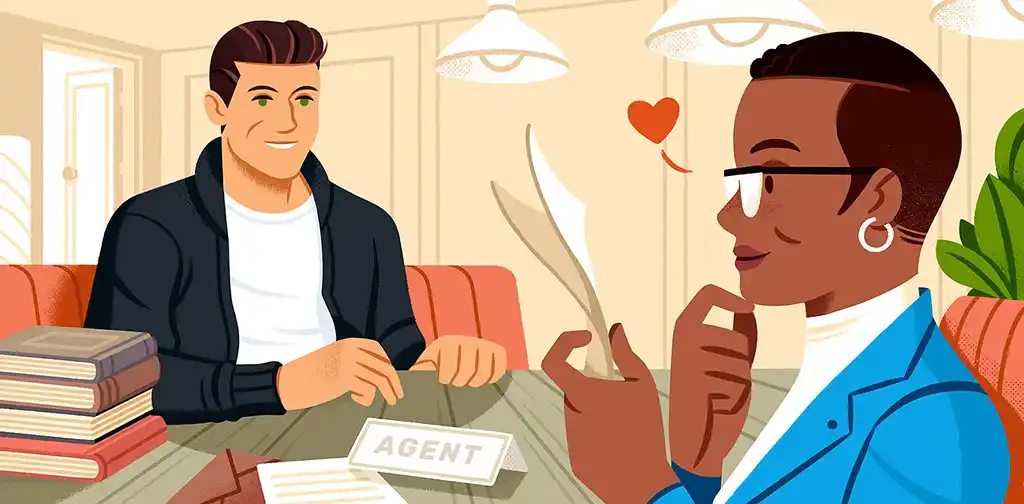
FREE EBOOK
The Insider’s Guide to Querying
The complete guide to finding an agent, stocked with tips from industry insiders.
3. Include a story synopsis
Now that you’ve “hooked” the agent, it’s time to reel them in with your book synopsis.
“The synopsis should really get an agent interested in your book,” says Reedsy editor and former agent Erin Young. “Think as if you're writing the back cover of your book for future readers.”
In other words, your synopsis is your opportunity to shed more light on:
- The plot
- The primary characters
- The central questions or conflicts that drive your story
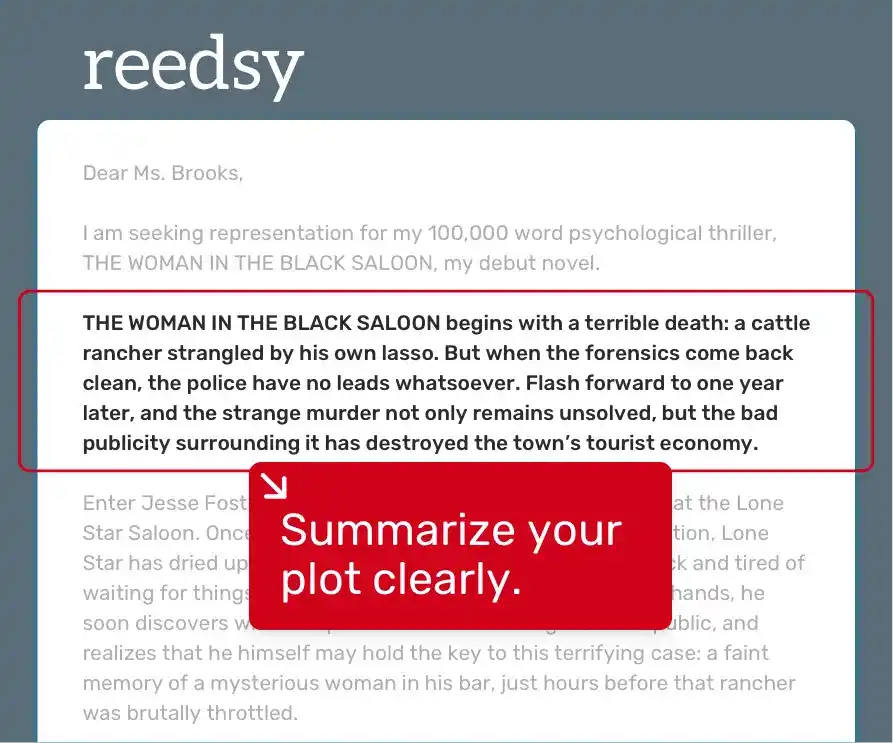
Plot, characters, and central conflict
Following Erin’s suggestion, let’s look at the back cover of Gillian Flynn’s Gone Girl and see how its blurb introduces these elements.
On a warm summer morning in North Carthage, Missouri, it is Nick and Amy Dunne’s fifth wedding anniversary. Presents are being wrapped and reservations are being made when Nick’s clever and beautiful wife disappears.
Husband-of-the-Year Nick isn’t doing himself any favors with cringe-worthy daydreams about the slope and shape of his wife’s head, but passages from Amy's diary reveal the alpha-girl perfectionist could have put anyone dangerously on edge. Under mounting pressure from the police and the media — as well as Amy’s fiercely doting parents — the town golden boy parades an endless series of lies, deceits, and inappropriate behavior.
Nick is oddly evasive, and he’s definitely bitter — but is he really a killer?
With just over 100 words, this synopsis lays out the plot, offers an impression of two multi-layered characters, and leaves us with the question that serves as the book’s engine: Did Nick kill his wife?
Even without a grand mystery at the center of your book, you can still grip agents by vividly defining the central conflict and stakes. High stakes help readers invest in your characters and stories; otherwise, there's no reason to care about the outcome of your book. So, make sure your query letter clearly shows what your protagonists stand to win or lose.
🧮 Combined, your hook and synopsis should make up around 50% of your letter. Since the letter should be max 400 words in total, that’s 200 words or less.
4. Compare your book to published titles
At the end of your synopsis, you can mention some comparable titles (also known as comp titles) and authors to show that you’re going to be an informed publishing partner with an awareness of the market. There are a few ways you can go about it:
“X meets Y” — This classic “Hollywood formula” shows how your book combines elements from two different titles.
This book has the sprawling fantasy feel of Erin Morgenstern’s The Starless Sea with the dark feminist bent of Silvia Moreno-Garcia’s Mexican Gothic.
“For fans of” — You could identify a few authors whose writing style is reminiscent of your own and mention them as a reference point.
For fans of Vera Kurian and Deanna Raybourn, this book is a sharp, riveting thriller.
“Comparable titles include:” — You could also try directly mentioning a couple of comp titles, as long as you’re confident the agent will know them and get the reference.
Comparable titles: The Iliac Crest by Cristina Rivera Garza, The Wonders by Elena Medel, Brickmakers by Selva Almada.
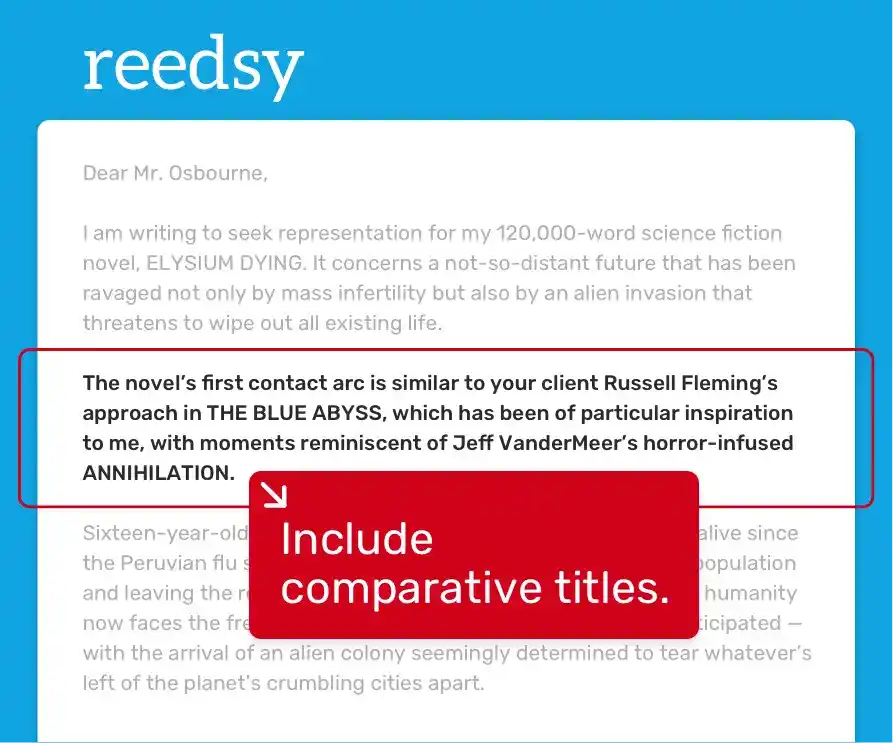
Overall, you want to make the agent think, “Ooh, I like those books! Maybe I’ll like this one as well.” However, avoid comparing your manuscript to:
- Mega-successful books. You probably don’t have the next Harry Potter series.
- Hyper-obscure books. They won’t be impressed, they'll just be bewildered.
- Books that are too dissimilar. “High Fidelity meets War and Peace” paints a weird picture.
- Outdated books. Comparing your book to The Da Vinci Code might have been impressive 20 years ago, but today would make you seem totally out of the zeitgeist.
And now that the hard part is over, let’s talk about you: the author!
5. Pitch your author credentials
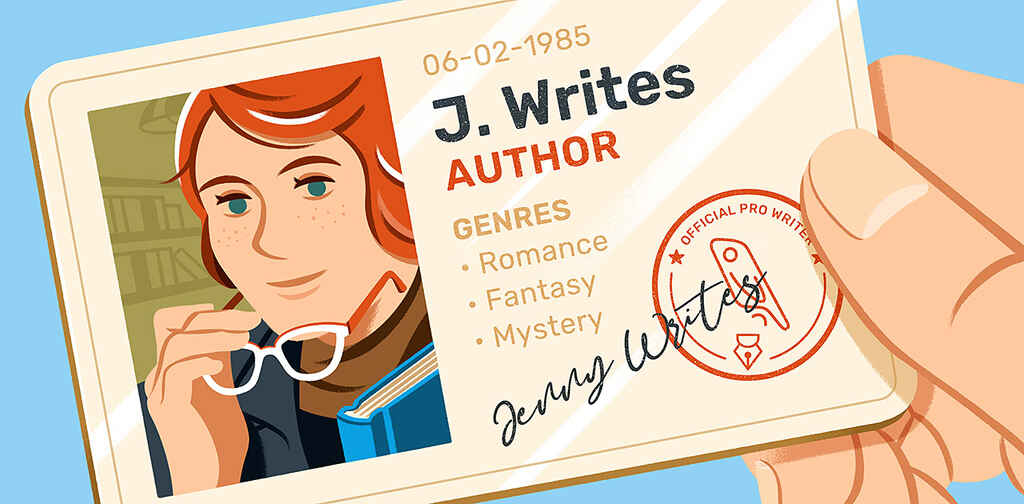
After your synopsis, write a short author bio to show what you’ve accomplished as a writer. This will give the agent a little bit more context about your publishing experience and potential. If you’ve already shown off some credentials in the greeting part, you can either skip this one or add more relevant information.
Here are some ways in which you can (subtly) toot your own horn:
Share your accomplishments
When presenting yourself, avoid rambling about your day job or literary ambitions. Instead, stick to your accomplishments. For example:
- Have you had any books or short stories published?
- Have you won any awards or writing contests?
- Are you a graduate of a creative writing program?
- Have you attended any writing conferences, workshops, or retreats?
If yes, mention the most impressive feats in a line or two. Here’s an example:
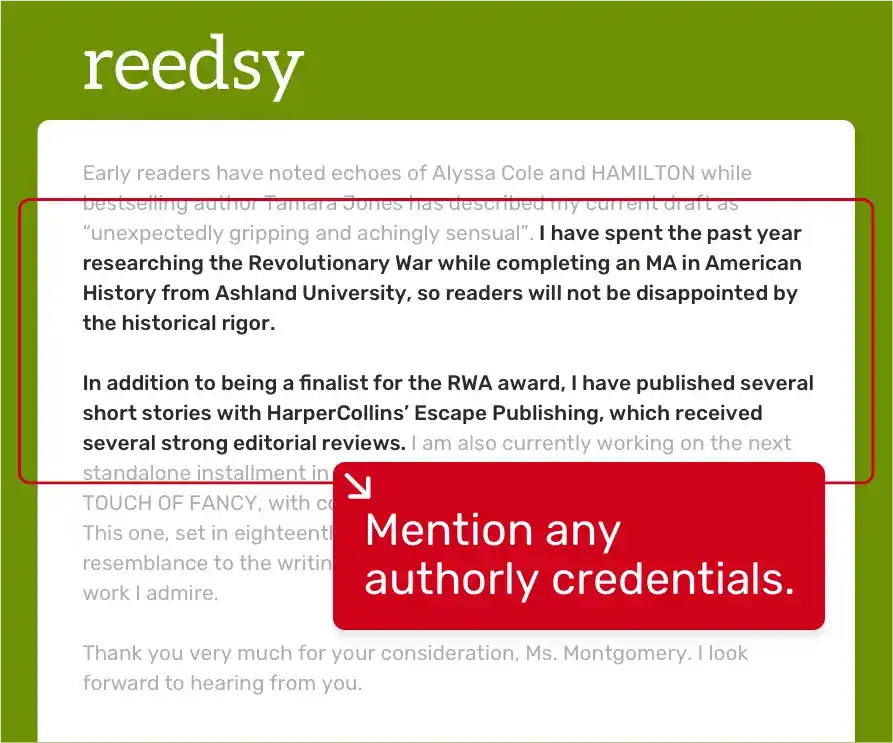
Read the full query letter example right here.
If you also have a significant social media following, this is the time to bring it up. It will let the agent know that you can help your book become a success. However, having an audience is more important for nonfiction authors than for novel writers. You could write something along these lines:
I gave a TEDx talk about effective communication in the digital age, was a speaker at the London Book Fair, and have 75,000 followers on Twitter.
Besides your accomplishments, you can share some relevant info about your background and why you’re the right person to write your book.
Reveal why the subject matter means so much to you
You could also mention your inspiration for writing your book or explain why you’re particularly suited to do this story justice. For example, this is what Sonora Reyes mentioned in her query letter for The Lesbiana's Guide to Catholic School:
I've written largely from my own experience as a queer first-generation immigrant who attended a Catholic high school.
Agents are often looking for unique and culturally relevant perspectives, so you can leverage yours as a selling point.
But a simple one-line bio is fine
Overall, if you don’t have any quantifiable writing chops, it’s okay to write: “I live in Poughkeepsie with my wife and three kids. This is my first novel.” Many agents are open to debut authors and will mainly judge your letter on the story premise.
Now that you have all the essential ingredients of your query letter, it’s time to customize it and perfect the finer details.
6. Personalize to stand out from other queries
Querying is a numbers game 一 you’ll likely have to send dozens of letters before (hopefully) finding representation. While you might be tempted to blast agents with a one-size-fits-all letter, a bit of personalization can go a long way.
As Reedsy editor and former agent Amy Bishop points out: “You can tell when the letter’s just a generic copy-and-paste job. It indicates that the author hasn't done their research on the agent or agency they're querying.”
That being said, the personalization should be sincere and thoughtful. You can include it in your letter’s opening, as mentioned in the first step, or after your author bio as a final note to conclude.
💡 Tip: Agents who prefer online submissions will sometimes add a specific form field (e.g., “Why A+ Literary Agency?” or “Why do you want to work with me?”) where you can write a custom message.
Reference their client list
There are several ways you can add a personal touch to your letter. One of the easiest ones is to reference the agent’s existing clients:
I am a huge fan of your client, Michael Chabon. The setting of The Yiddish Policemen’s Union was a major influence on my novel.
Of course, don’t lie about liking a book or exaggerate your praise and enthusiasm. Most agents won’t want a sycophant for a client!
Reference their wish lists
Many agents make known their manuscript preferences by sharing their wish lists on Twitter or their own websites, which you can reference to personalize your pitch.
I see you’re looking for cozy mysteries geared towards Millennial readers. For this reason, I thought that Murders and Avocado Toasts might fit well on your list.
Agents are always looking for reasons to take a chance on a new author — and giving them a good reason to do so (like how it would help their career) is always a good idea.
Mention something they’ve said in public
Or if you want to do one better, refer to something that the agent has written or mentioned in public before.
I saw your presentation at the Literary Writers Conference last year, and your comments on the dearth of female protagonists in fantasy really resonated with me. My book attempts to redress that.
As with your praise of their clients, don’t lay it on too thick. If you tell an agent that something they tweeted “changed the course of your destiny,” they might find the prospect of meeting you in person a bit uncomfortable!
7. Close the letter by thanking the agent
Finally, end the letter with a formal salutation.
Thanks for your consideration. I look forward to hearing from you.
Sincerely,
Your Name
No muss, no fuss. Don’t try to arrange a meeting or tell them how amazing it would be to work together. Just thank them and sign off!
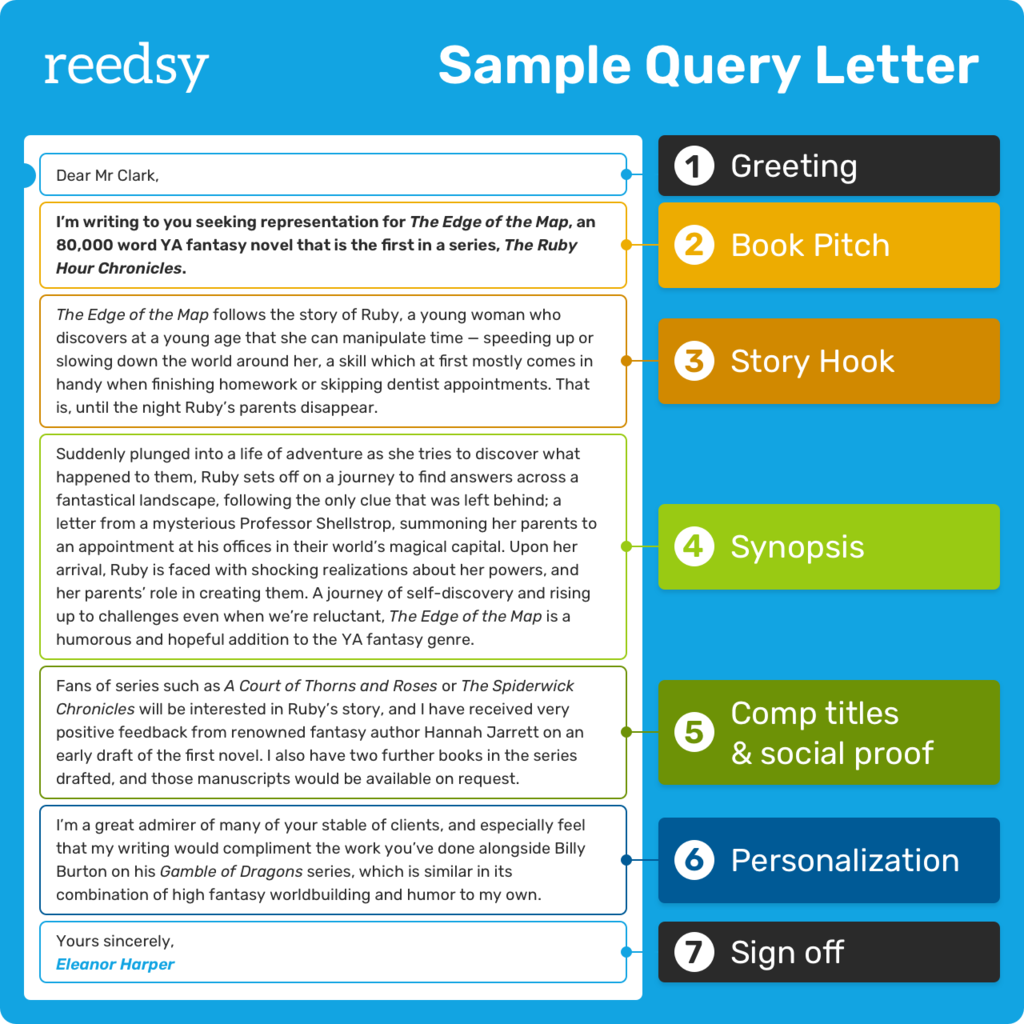
Formatting rules of thumb
Before you send anything, don’t forget to double-check your formatting! Make sure to format your documents according to each agent’s submission guidelines, or else your query could be disregarded automatically (and regrettably).
Two primary methods to send queries are online submission forms (e.g., QueryManager) and email (e.g., Gmail or Outlook). Snail mail is extremely rare these days. Many authors prepare their letters in a Word or Google document and then copy-paste the text in the submission form or the email body, but you could also be asked to send your letter as a Word or PDF attachment.
If in doubt, keep things simple with your letter formatting:
- 12-point Arial or Times New Roman font
- 1.5 or double line spacing
- Separate your paragraphs with a simple blank line
- Avoid indented paragraphs, colored fonts, or excessive bold and/or italic words
💼 A query letter is effectively a business email, so keep it as clean and professional as possible.
Similar formatting rules apply to the first few chapters of your manuscript, which authors are often asked to send alongside the letter. Use the template in our downloadable query kit to ensure your letter looks professional and ready to impress (see the top of this post).
8. Hire a professional editor for a query letter review
Finally, if you want to guarantee that your query letter is firing on all cylinders and taken seriously, you can get a query letter review from a professional editor. This will ensure that every part of your letter is perfectly honed — and perhaps more importantly, that you aren’t sending any red flags to agents.
Why is getting a query letter review from a professional so much better than, say, having a friend read it over? Well, you’ll be able to work with an editor who’s actually been an acquiring editor for a publisher, or maybe even an agent themselves. This insider industry knowledge can be a game-changer for authors struggling to sell their books.
And compared to most editing costs, the cost of a query letter review is a real bargain — most Reedsy editors charge between $50 and $250 for this service. Considering that a compelling query letter could be your gateway to a generous advance and lucrative career as an author, it might be the best return on investment you'll ever get.

Polish your query letter with expert help
Many Reedsy editors used to be top agents and can help you find the edge. Come meet them.
Learn how Reedsy can help you craft a beautiful book.
And that concludes our post on how to write a query letter! To see more query letter examples (and what you can expect from a query letter review), check out Part 3 in this series. We've posted letters from a range of genres that have been reviewed and improved by our very own Reedsy editors!



16 responses
Cheryl Charlesworth says:
02/11/2017 – 18:19
Best damn post this side of the Altantic....thank you.
↪️ Reedsy replied:
02/11/2017 – 23:23
Aw, thank you! Glad you liked it!
Olga GOA says:
02/11/2017 – 20:22
Hello. But how to find this agent? :D
↪️ Reedsy replied:
02/11/2017 – 23:24
Ah, that's where the research comes in. In the next few weeks we'll be following this post up with another one that will be all about researching agents. Watch this space, as they say :)
Mandy Suhre says:
12/11/2017 – 05:16
I write screenplays and poetry. Can anybody help with that? Please and thank you, Mandy (Suhre) Brown
↪️ Sadie Francis Skyheart replied:
28/08/2019 – 15:57
What Reedsy does for authors, ScreenwritingU does for screenwriters. If you haven't checked it out, I highly recommend!
Aleksandr says:
07/12/2017 – 14:59
At first glance, the recommendations are worth it to be read. You have perfectly divided everything into parts: grab the attention of the agent, write a brief overview. If our experience in such letters is not great, but you really want to get the result from such a letter, then it is better to go to a professional. Of course, is cool when you all know how. But sometimes, some things should be transferred to another, for the sake of result. You can write great articles like Neil https://neilpatel.com/blog/, or books like https://en.wikipedia.org/wiki/Stephen_King. But in attracting the attention of the agent can be much more difficult. After tens of unsuccessful attempts, I went to https://writingpaper.org/. I was perfectly satisfied with the work, and I got several meetings with agents that I needed. So sometimes it is important to distribute your efforts correctly.
Cher says:
31/07/2018 – 20:46
Thank you, thank you! This post is extremely helpful!!
jturkish says:
27/01/2019 – 23:13
Sorry folks, aside from the advice to pander to the audience in the first lines of your query and manuscript (which I don't agree with. If your manuscript is good you don't have to pander, have some respect for yourself and your audience! Besides, Gone Girl and especially Twilight, aren't very good novels,) and that your Synopsis should read like a Query Letter (I was trained that a Synopsis or Outline is just that, your entire novel as distilled as possible, ex: a two hundred page novel described completely in less than five pages, a description.) This is the exact same advice I've had in every other publishing column I've ever read, and what I foolishly spent twenty thousand to learn in college. Unless you are an absolute grass roots beginner, save your eyes, your time, and your sanity, for reading Agent's biographies and expectations instead of reading this column. And if you are a grass roots beginner (looking at you college creative writing class kids out there, of whom this page seems aimed at), do another edit on your book, or write another novel entirely. Get some experience under your belt, enjoy being an artist, join your school's society of uber geeks, drink beer, talk about your favorite books, read and critique each other's manuscripts, talk about your favorite Simpson's episodes, meet some very interesting people and incorporate them in your novels; before spending all your free time trying to break into the subjective rat race that is writing at a professional level. Don't worry, the writing biz will still be here when you graduate.
janis hutchinson says:
25/06/2019 – 20:52
I wish you also had an article describing a nonfiction (mine is Christian) query letter. Is there one somewhere?
Chloe says:
07/08/2019 – 19:29
When should I be worried if the agent doesn't respond back?
↪️ Yvonne replied:
08/08/2019 – 01:43
Hi Chloe, agents are very busy, so it could take a couple of weeks to even two or three months to get a response. Some literary agencies have guidelines posted on their website on when to follow up on an unanswered query — check those, as it could be helpful.
Chloe says:
07/08/2019 – 19:30
When should be get worried if the agent doesn't respond back?
Sadie Francis Skyheart says:
28/08/2019 – 15:58
Excellent advice. :-)
B.L. Alley says:
04/11/2019 – 19:56
As usual, this advice is geared toward those who already have a foot in the door.
↪️ Martin Cavannagh replied:
05/11/2019 – 14:14
Not really, to be fair... most agents will tell you that they will, at various points in the year, be looking through the "slush pile" for new authors to represent. These steps are designed to help totally unknown authors stand out from the countless authors who submit overlong, unfocuses query letters.